Charles E W Bean, Diaries, AWM38 3DRL 606/259/1 - 1917 - 1927 - Part 2
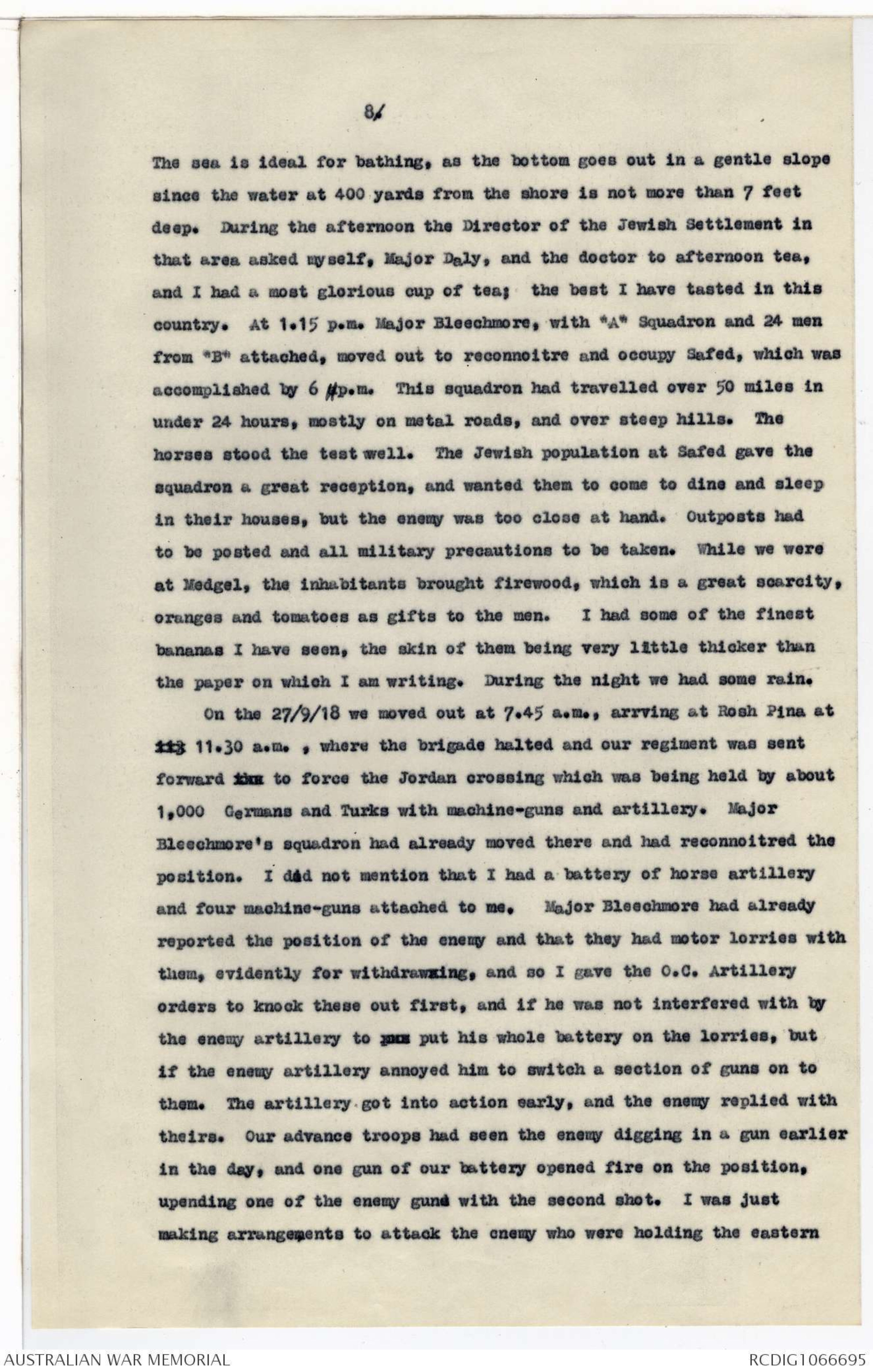
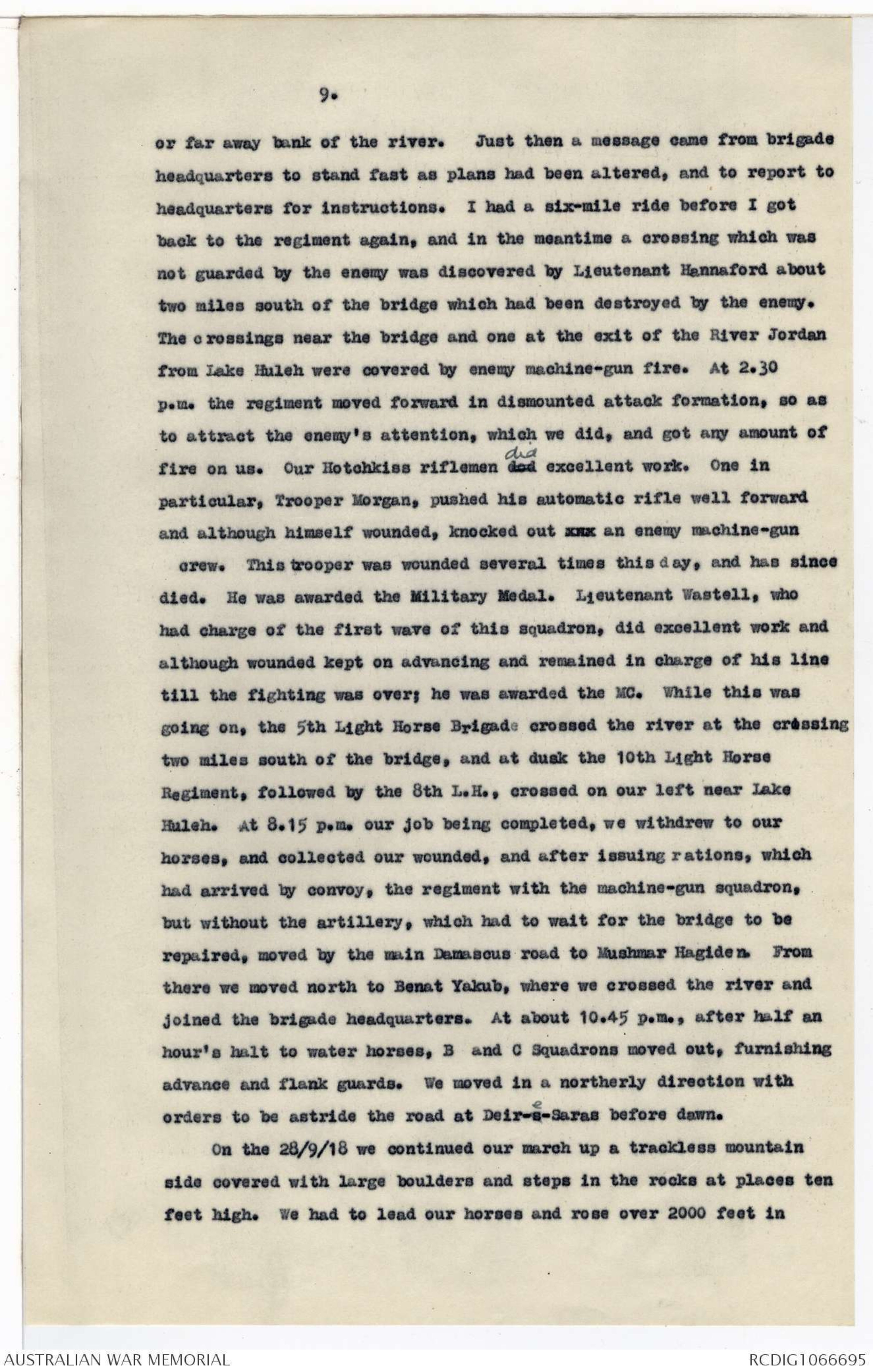
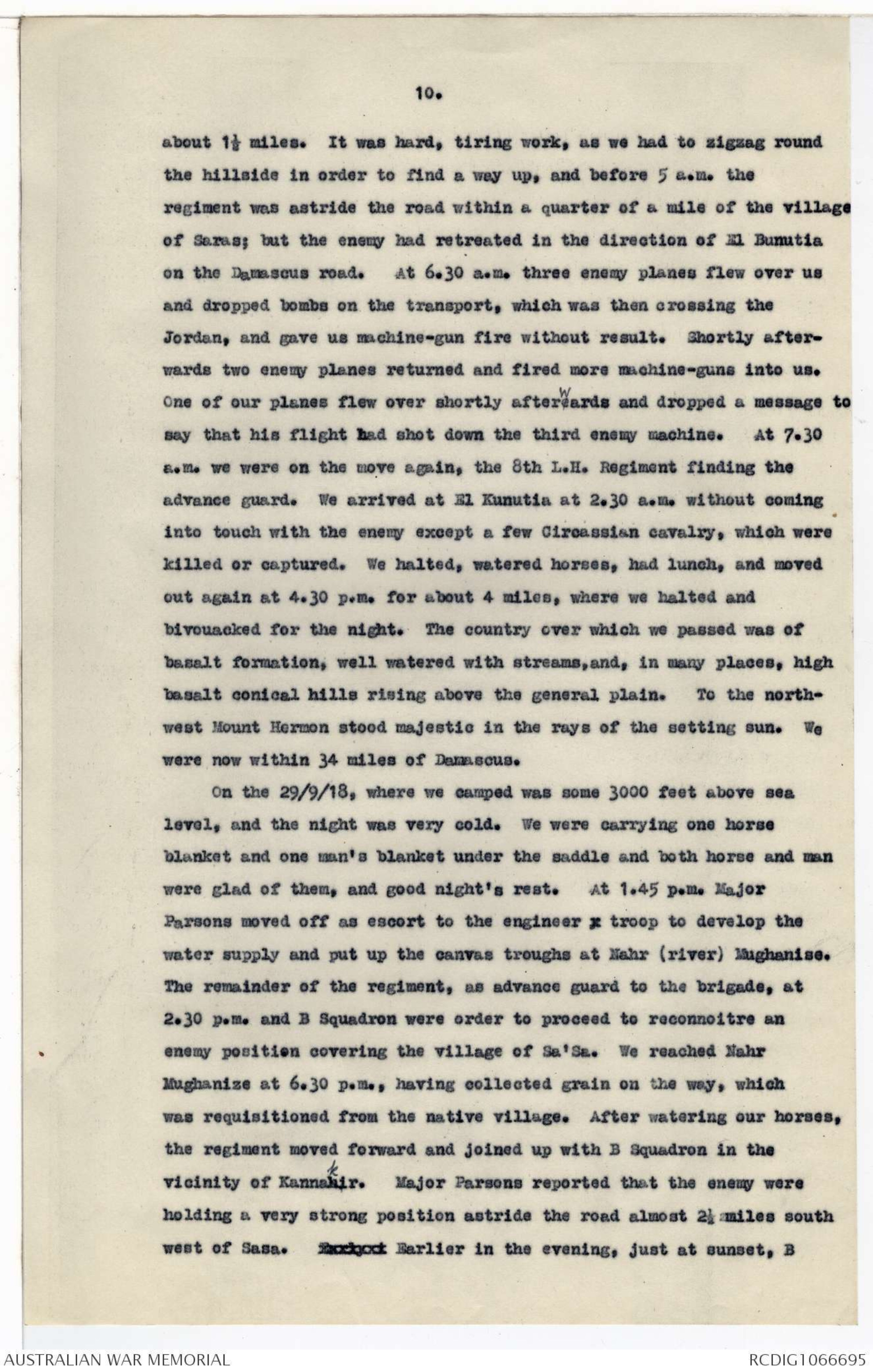
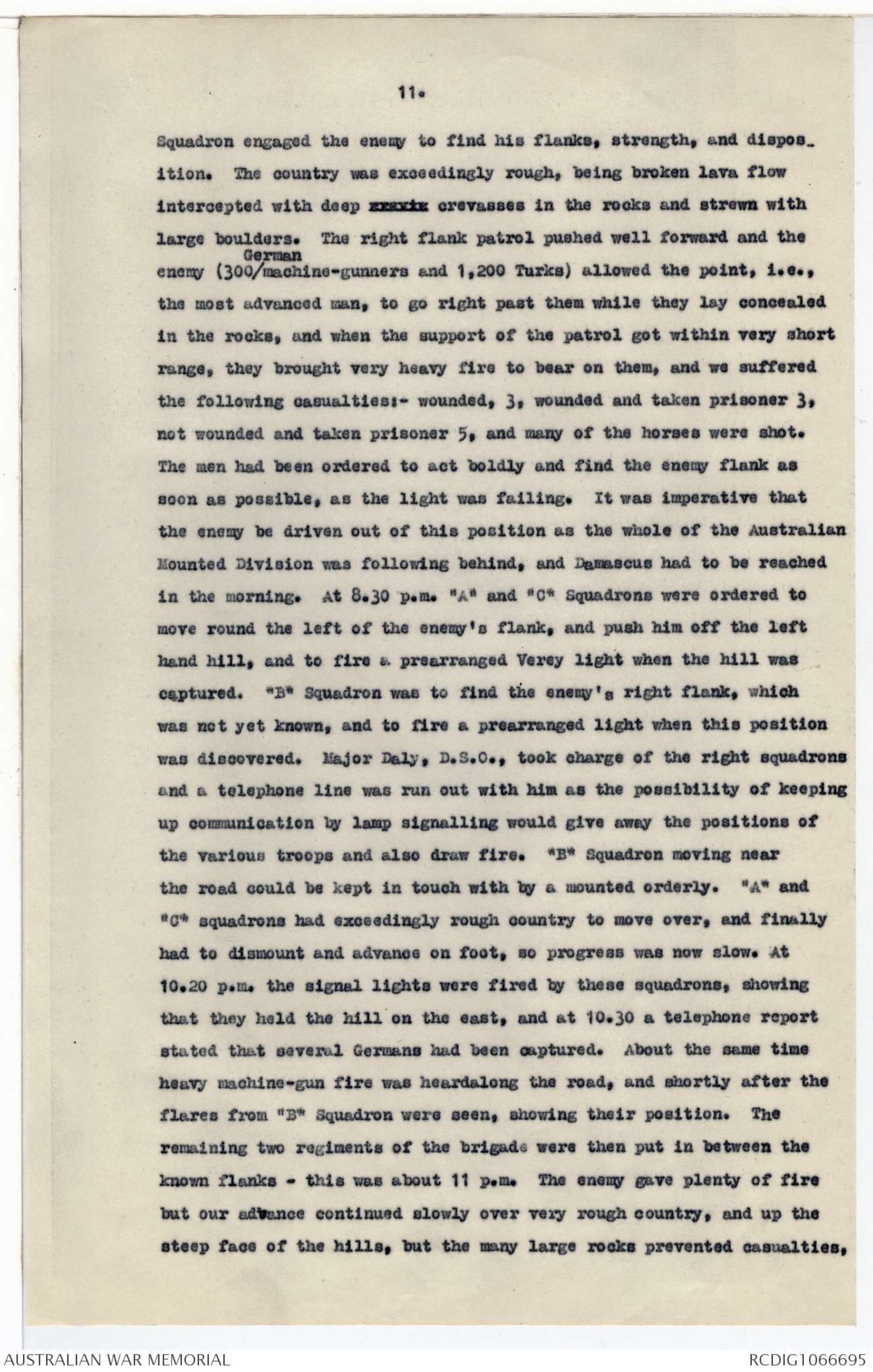
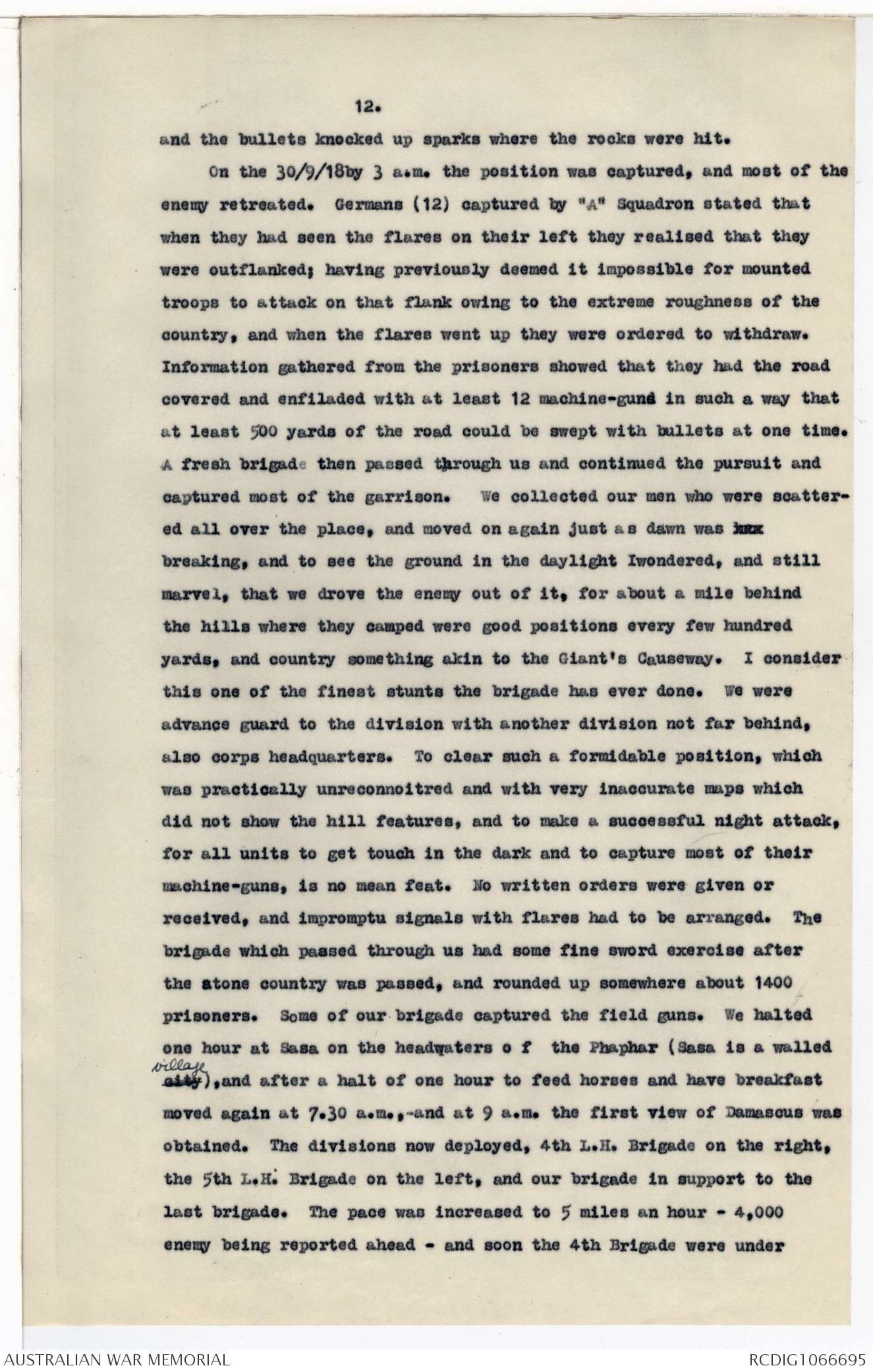
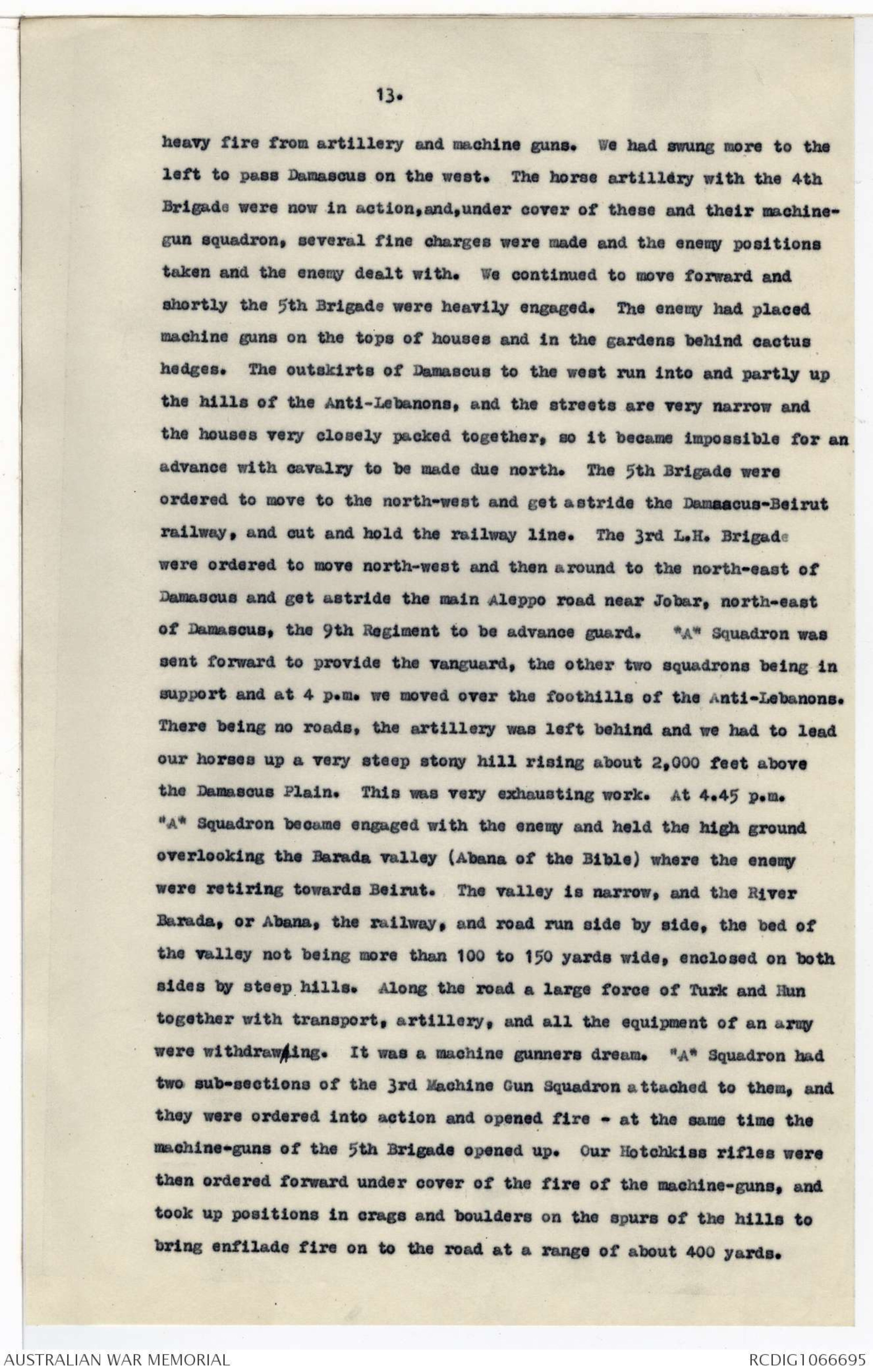
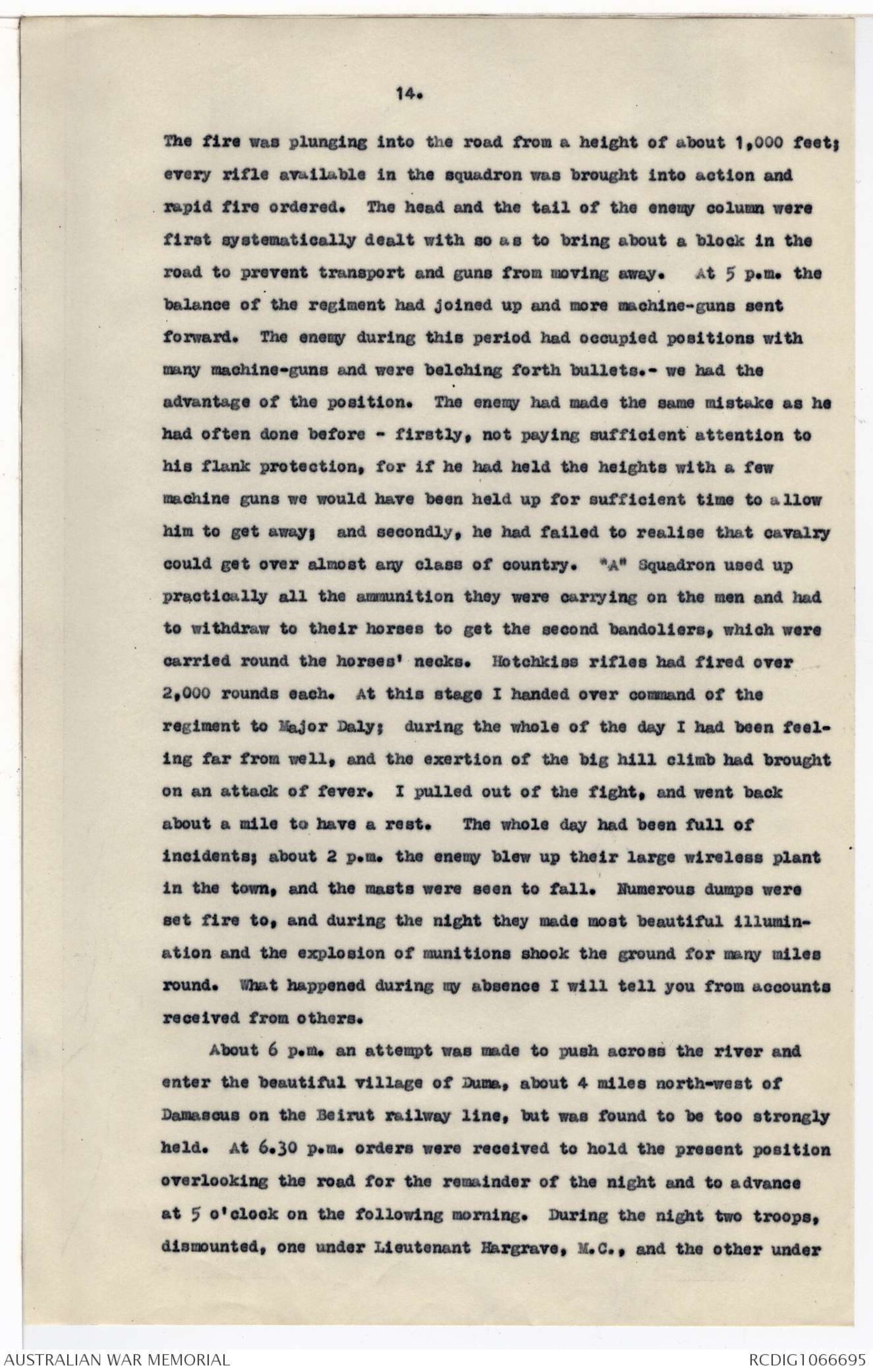
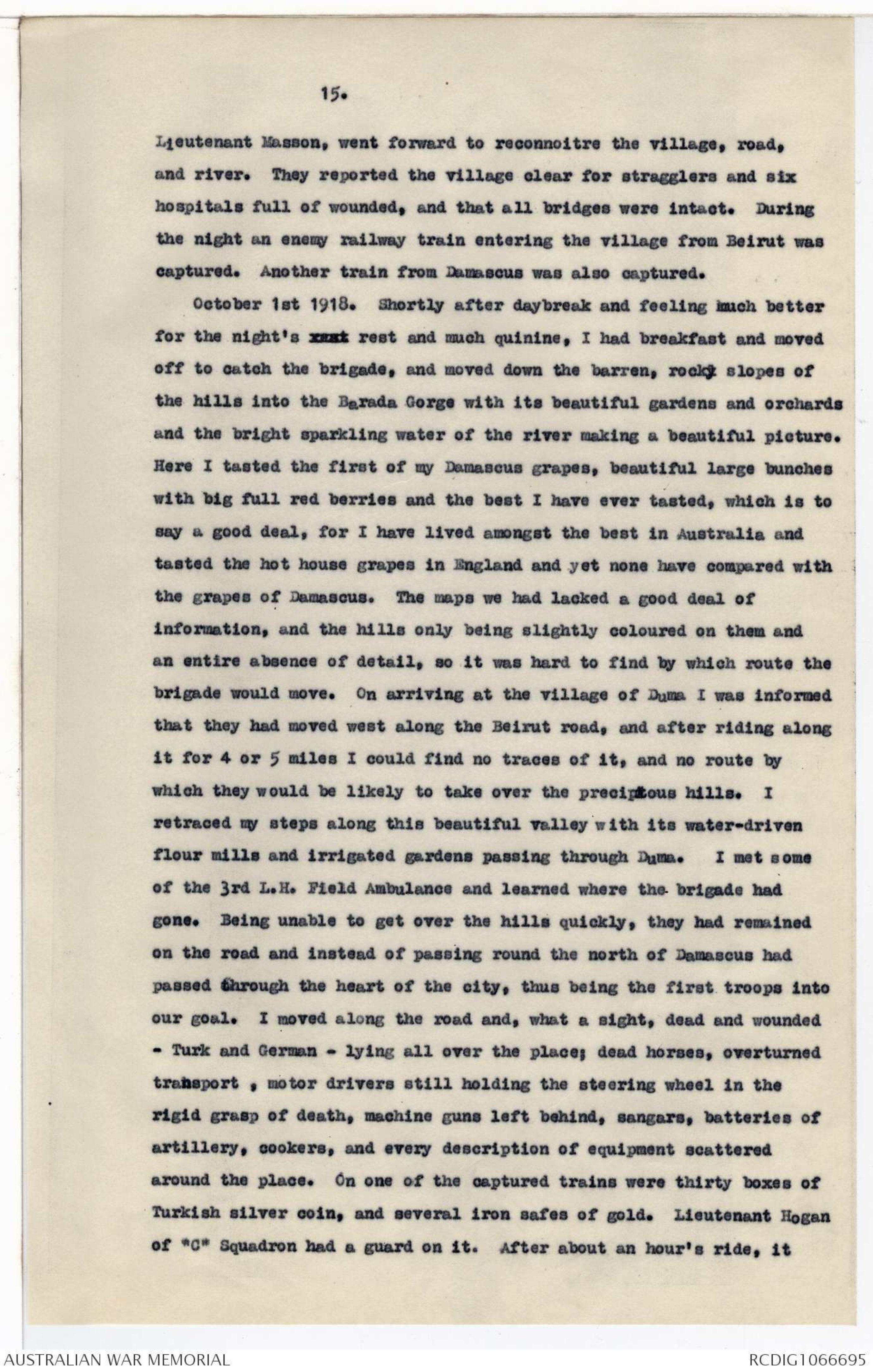
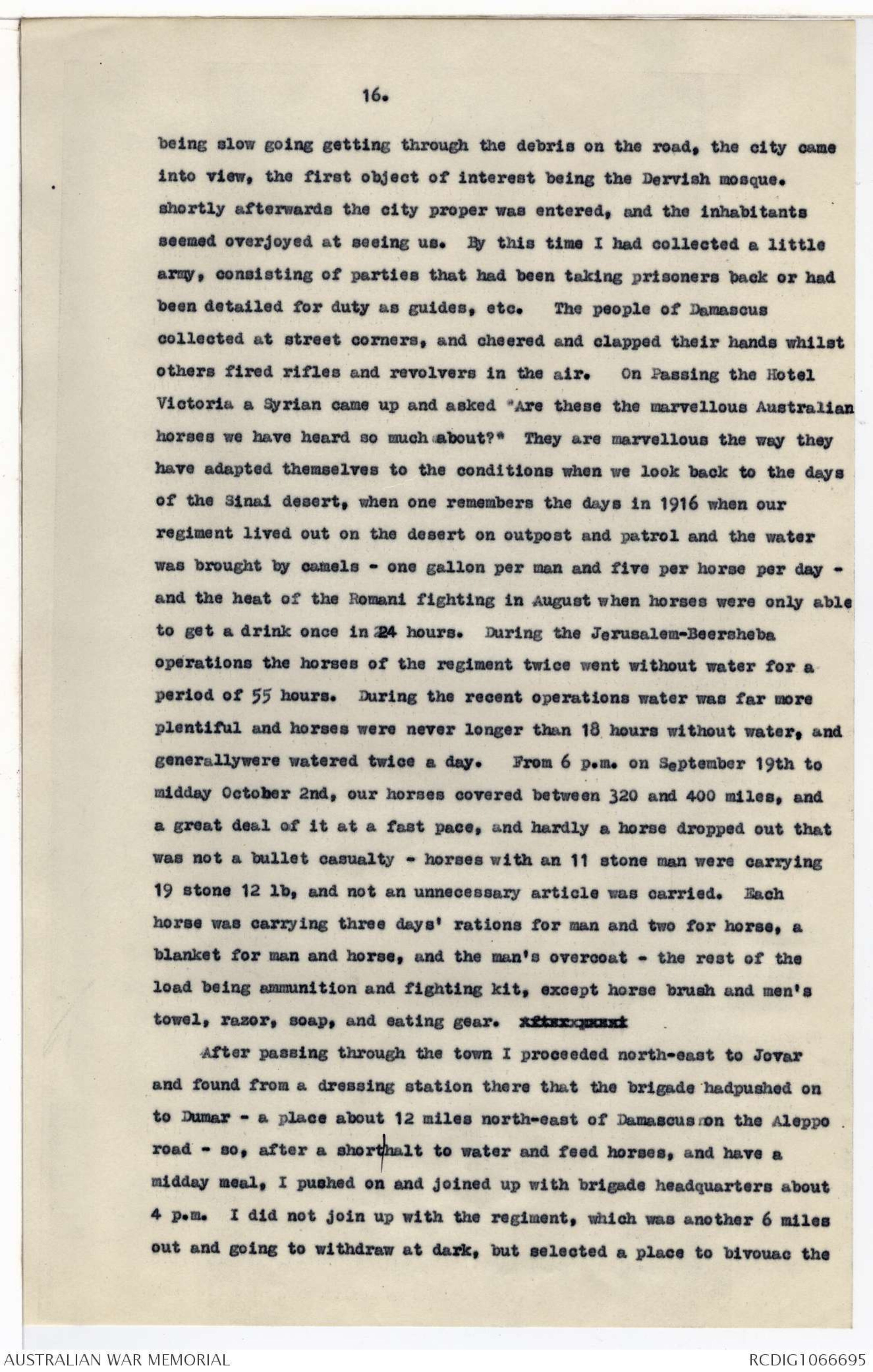
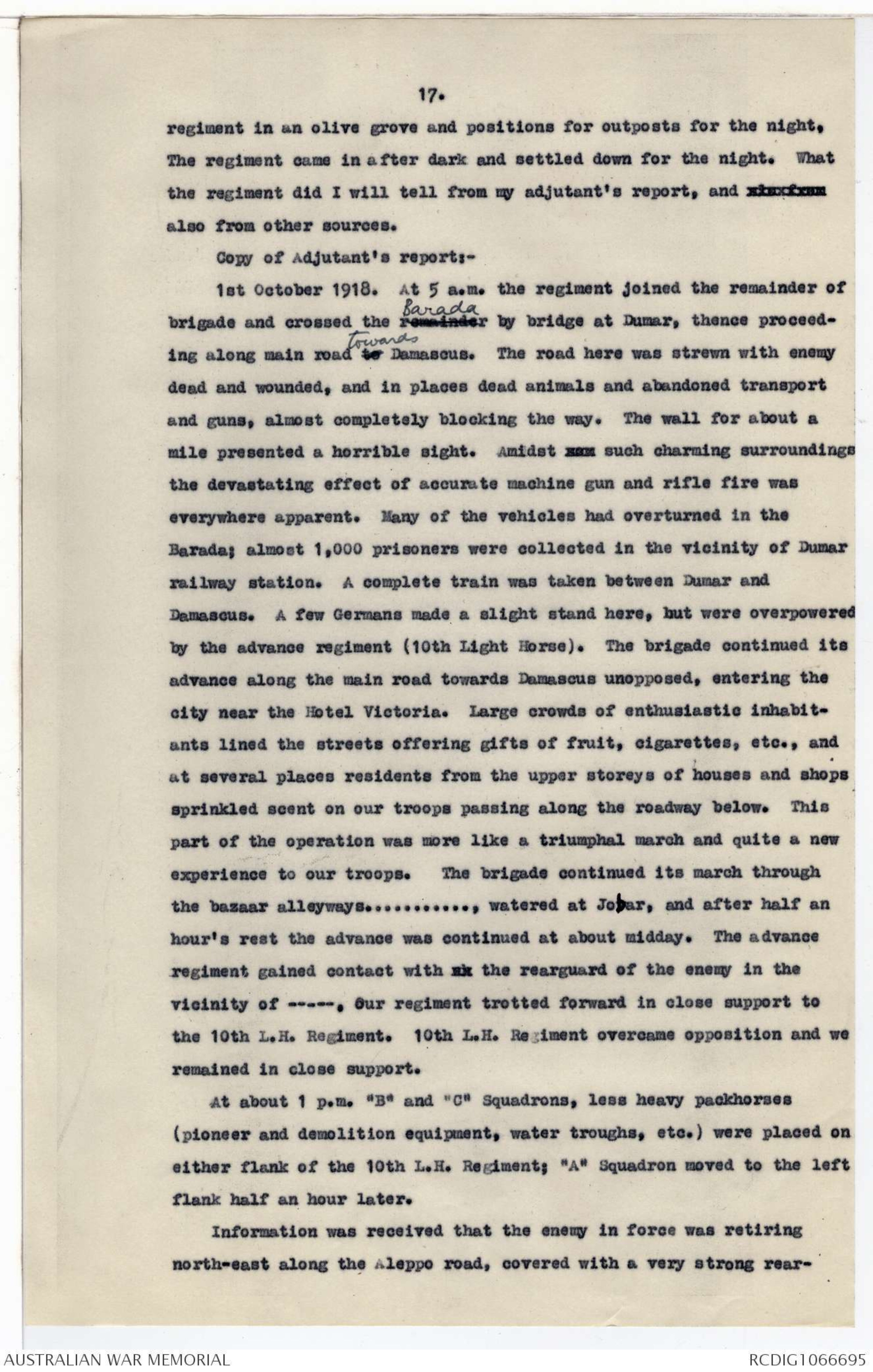
8/
The sea is ideal for bathing, as the bottom goes out in a gentle slope
since the water at 400 yards from the shore is not more than 7 feet
deep. During the afternoon the Director of the Jewish Settlement in
that area asked myself, Major Daly, and the doctor to afternoon tea,
and I had a most glorious cup of tea; the best I have tasted in this
country. At 1.15 p.m. Major Bleechmore, with "A” Squadron and 24 men
from “B” attached, moved out to reconnoitre and occupy Safed, which was
accomplished by 6 xp.m. This squadron had travelled over 50 miles in
under 24 hours, mostly on metal roads, and over steep hills. The
horses stood the test well. The Jewish population at Safed gave the
squadron a great reception, and wanted them to come to dine and sleep
in their houses, but the enemy was too close at hand. Outposts had
to be posted and all military precautions to be taken. While we were
at Medgel, the inhabitants brought firewood, which is a great scarcity,
oranges and tomatoes as gifts to the men. I had some of the finest
bananas I have seen, the skin of them being very little thicker than
the paper on which I am writing. During the night we had some rain.
On the 27/9/18 we moved out at 7.45 a.m., arrving at Rosh Pina at113 11.30 a.m., where the brigade halted and our regiment was sent
forward the to force the Jordan crossing which was being held by about
1,000 Germans and Turks with machine-guns and artillery. Major
Bleechmore's squadron had already moved there and had reconnoitred the
position. I did not mention that I had a battery of horse artillery
and four machine-guns attached to me. Major Bleechmore had already
reported the position of the enemy and that they had motor lorries with
them, evidently for withdrawing, and so I gave the O.C. Artillery
orders to knock these out first, and if he was not interfered with by
the enemy artillery to xx put his whole battery on the lorries, but
if the enemy artillery annoyed him to switch a section of guns on to
them. The artillery got into action early, and the enemy replied with
theirs. Our advance troops had seen the enemy digging in a gun earlier
in the day, and one gun of our battery opened fire on the position,
upending one of the enemy guns with the second shot. I was just
making arrangements to attack the enemy who were holding the eastern
or far away bank of the river. Just then a message came from brigade
headquarters to stand fast as plans had been altered, and to report to
headquarters for instructions. I had a six-mile ride before I got
back to the regiment again, and in the meantime a crossing which was
not guarded by the enemy was discovered by Lieutenant Hannaford about
two miles south of the bridge which had been destroyed by the enemy.
The crossings near the bridge and one at the exit of the River Jordan
from Lake Huleh were covered by enemy machine-gun fire. At 2.30
p.m. the regiment moved forward in dismounted attack formation, so as
to attract the enemy's attention, which we did, and got any amount of
fire on us. Our Hotchkiss riflemen did excellent work. One in
particular, Trooper Morgan, pushed his automatic rifle well forward
and although himself wounded, knocked out xxx an enemy machine-gun
crew. This trooper was wounded several times this day, and has since
died. He was awarded the Military Medal. Lieutenant Wastell, who
had charge of the first wave of this squadron, did excellent work and
although wounded kept on advancing and remained in charge of his line
till the fighting was over; he was awarded the MC. While this was
going on, the 5th Light Horse Brigade crossed the river at the crossing
two miles south of the bridge, and at dusk the 10th Light Horse
Regiment, followed by the 8th L.H., crossed on our left near Lake
Huleh. At 8.15 p.m. our job being completed, we withdrew to our
horses, and collected our wounded, and after issuing rations, which
had arrived by convoy, the regiment with the machine-gun squadron,
but without the artillery, which had to wait for the bridge to be
repaired, moved by the main Damascus road to Mushmar Hagiden. From
there we moved north to Benat Yakub, where we crossed the river and
joined the brigade headquarters. At about 10.45 p.m., after half an
hour's halt to water horses, B and C Squadrons moved out, furnishing
advance and flank guards. We moved in a northerly direction with
orders to be astride the road at Deir-e-Saras before dawn.
On the 28/9/18 we continued our march up a trackless mountain
side covered with large boulders and steps in the rocks at places ten
feet high. We had to lead our horses and rose over 2000 feet in
10.
about 1½ miles. It was hard, tiring work, as we had to zigzag round
the hillside in order to find a way up, and before 5 a.m. the
regiment was astride the road within a quarter of a mile of the village
of Saras; but the enemy had retreated in the direction of El Bunutia
on the Damascus road. At 6.30 a.m. three enemy planes flew over us
and dropped bombs on the transport, which was then crossing the
Jordan, and gave us machine-gun fire without result. Shortly afterwards
two enemy planes returned and fired more machine-guns into us.
One of our planes flew over shortly afterweards and dropped a message to
say that his flight had shot down the third enemy machine. At 7.30
a.m. we were on the move again, the 8th L.H. Regiment finding the
advance guard. We arrived at El Kunutia at 2.30 a.m. without coming
into touch with the enemy except a few Circassian cavalry, which were
killed or captured. We halted, watered horses, had lunch, and moved
out again at 4.30 p.m. for about 4 miles, where we halted and
bivouacked for the night. The country over which we passed was of
basalt formation, well watered with streams, and, in many places, high
basalt conical hills rising above the general plain. To the north-
west Mount Hermon stood majestic in the rays of the setting sun. We
were now within 34 miles of Damascus.
On the 29/9/18, where we camped was some 3000 feet above sea
ievel, and the night was very cold. We were carrying one horse
blanket and one man's blanket under the saddle and both horse and man
were glad of them, and good night's rest. At 1.45 p.m. Major
Parsons moved off as escort to the engineer x troop to develop the
water supply and put up the canvas troughs at Nahr (river) Mughanise.
The remainder of the regiment, as advance guard to the brigade, at
2.30 p.m. and B Squadron were order to proceed to reconnoitre an
enemy position covering the village of Sa'Sa. We reached Nahr
Mughanize at 6.30 p.m., having collected grain on the way, which
was requisitioned from the native village. After watering our horses,
the regiment moved forward and joined up with B Squadron in the
vicinity of Kannahkir. Major Parsons reported that the enemy were
holding a very strong position astride the road almost 2¼ miles south
west of Sasa. xxxxxxx Earlier in the evening, just at sunset, B
11.
Squadron engaged the enemy to find his flanks, strength, and disposition.
The country was exceedingly rough, being broken lava flow
intercepted with deep xxxx crevasses in the rocks and strewn with
large boulders. The right flank patrol pushed well forward and the
enemy (300/German machine-gunners and 1,200 Turks) allowed the point, i.e.,
the most advanced man, to go right past them while they lay concealed
in the rocks, and when the support of the patrol got within very short
range, they brought very heavy fire to bear on them, and we suffered
the following casualties:- wounded, 3, wounded and taken prisoner 3,
not wounded and taken prisoner 5, and many of the horses were shot.
The men had been ordered to act boldly and find the enemy flank as
soon as possible, as the light was failing. It was imperative that
the enemy be driven out of this position as the whole of the Australian
Mounted Division was following behind, and Damascus had to be reached
in the morning. At 8.30 p.m. "A' and "C' Squadrons were ordered to
move round the left of the enemy's flank, and push him off the left
hand hill, and to fire a prearranged Verey light when the hill was
captured. "B' Squadron was to find the enemy's right flank, which
was not yet known, and to fire a prearranged light when this position
was discovered. Major Daly, D.S.O., took charge of the right squadrons
and a telephone line was run out with him as the possibility of keeping
up communication by lamp signalling would give away the positions of
the various troops and also draw fire. 'B' Squadron moving near
the road could be kept in touch with by a mounted orderly. 'A' and
"C" squadrons had exceedingly rough country to move over, and finally
had to dismount and advance on foot, so progress was now slow. At
10.20 p.m. the signal lights were fired by these squadrons, showing
that they held the hill on the east, and at 10.30 a telephone report
stated that several Germans had been captured. About the same time
heavy machine-gun fire was heardalong the road, and shortly after the
flares from 'B' Squadron were seen, showing their position. The
remaining two regiments of the brigade were then put in between the
known flanks - this was about 11 p.m. The enemy gave plenty of fire
but our advance continued slowly over very rough country, and up the
steep face of the hills, but the many large rocks prevented casualties
12.
and the bullets knocked up sparks where the rocks were hit.
On the 30/9/18 by 3 a.m. the position was captured, and most of the
enemy retreated. Germans (12) captured by "A” Squadron stated that
when they had seen the flares on their left they realised that they
were outflanked; having previously deemed it impossible for mounted
troops to attack on that flank owing to the extreme roughness of the
country, and when the flares went up they were ordered to withdraw.
Information gathered from the prisoners showed that they had the road
covered and enfiladed with at least 12 machine-guns in such a way that
at least 500 yards of the road could be swept with bullets at one time.
A fresh brigade then passed through us and continued the pursuit and
captured most of the garrison. We collected our men who were scattered
all over the place, and moved on again just as dawn was xxx
breaking, and to see the ground in the daylight Iwondered, and still
marvel, that we drove the enemy out of it, for about a mile behind
the hills where they camped were good positions every few hundred
yards, and country something akin to the Giant's Causeway. I consider
this one of the finest stunts the brigade has ever done. We were
advance guard to the division with another division not far behind,
also corps headquarters. To clear such a formidable position, which
was practically unreconnoitred and with very inaccurate maps which
did not show the hill features, and to make a successful night attack,
for all units to get touch in the dark and to capture most of their
machine-guns, is no mean feat. No written orders were given or
received, and impromptu signals with flares had to be arranged. The
brigade which passed through us had some fine sword exercise after
the stone country was passed, and rounded up somewhere about 1400
prisoners. Some of our brigade captured the field guns. We halted
one hour at Sasa on the headqaters o f the Phaphar (Sasa is a walledcity village), and after a halt of one hour to feed horses and have breakfast
moved again at 7.30 a.m.,-and at 9 a.m. the first view of Damascus was
obtained. The divisions now deployed, 4th L.H. Brigade on the right,
the 5th L.H. Brigade on the left, and our brigade in support to the
last brigade. The pace was increased to 5 miles an hour - 4,000
enemy being reported ahead - and soon the 4th Brigade were under
13.
heavy fire from artillery and machine guns. We had swung more to the
left to pass Damascus on the west. The horse artillery with the 4th
Brigade were now in action,and,under cover of these and their machine-
gun squadron, several fine charges were made and the enemy positions
taken and the enemy dealt with. We continued to move forward and
shortly the 5th Brigade were heavily engaged. The enemy had placed
machine guns on the tops of houses and in the gardens behind cactus
hedges. The outskirts of Damascus to the west run into and partly up
the hills of the Anti-Lebanons, and the streets are very narrow and
the houses very closely packed together, so it became impossible for an
advance with cavalry to be made due north. The 5th Brigade were
ordered to move to the north-west and get astride the Damascus-Beirut
railway, and cut and hold the railway line. The 3rd L.H. Brigade
were ordered to move north-west and then around to the north-east of
Damascus and get astride the main Aleppo road near Jobar, north-east
of Damascus, the 9th Regiment to be advance guard. "A" Squadron was
sent forward to provide the vanguard, the other two squadrons being in
support and at 4 p.m. we moved over the foothills of the Anti-Lebanons.
There being no roads, the artillery was left behind and we had to lead
our horses up a very steep stony hill rising about 2,000 feet above
the Damascus Plain. This was very exhausting work. At 4.45 p.m.
A' Squadron became engaged with the enemy and held the high ground
overlooking the Barada valley (Abana of the Bible) where the enemy
were retiring towards Beirut. The valley is narrow, and the River
Barada, or Abana, the railway, and road run side by side, the bed of
the valley not being more than 100 to 150 yards wide, enclosed on both
sides by steep hills. Along the road a large force of Turk and Hun
together with transport, artillery, and all the equipment of an army
were withdrawning. It was a machine gunners dream. "A' Squadron had
two sub-sections of the 3rd Machine Gun Squadron attached to them, and
they were ordered into action and opened fire - at the same time the
machine-guns of the 5th Brigade opened up. Our Hotchkiss rifles were
then ordered forward under cover of the fire of the machine-guns, and
took up positions in crags and boulders on the spurs of the hills to
bring enfilade fire on to the road at a range of about 400 yards.
14.
The fire was plunging into the road from a height of about 1,000 feet;
every rifle available in the squadron was brought into action and
rapid fire ordered. The head and the tail of the enemy column were
first systematically dealt with so as to bring about a block in the
road to prevent transport and guns from moving away. At 5 p.m. the
balance of the regiment had joined up and more machine-guns sent
forward. The enemy during this period had occupied positions with
many machine-guns and were belching forth bullets.- we had the
advantage of the position. The enemy had made the same mistake as he
had often done before - firstly, not paying sufficient attention to
his flank protection, for if he had held the heights with a few
machine guns we would have been held up for sufficient time to allow
him to get away; and secondly, he had failed to realise that cavalry
could get over almost any class of country. "A" Squadron used up
practically all the ammunition they were carrying on the men and had
to withdraw to their horses to get the second bandoliers, which were
carried round the horses' necks. Hotchkiss rifles had fired over
2,000 rounds each. At this stage I handed over command of the
regiment to Major Daly; during the whole of the day I had been feeling
far from well, and the exertion of the big hill climb had brought
on an attack of fever. I pulled out of the fight, and went back
about a mile to have a rest. The whole day had been full of
incidents; about 2 p.m. the enemy blew up their large wireless plant
in the town, and the masts were seen to fall. Numerous dumps were
set fire to, and during the night they made most beautiful illumination
and the explosion of munitions shook the ground for many miles
round. What happened during my absence I will tell you from accounts
received from others.
About 6 p.m. an attempt was made to push across the river and
enter the beautiful village of Duma, about 4 miles north-west of
Damascus on the Beirut railway line, but was found to be too strongly
held. At 6.30 p.m. orders were received to hold the present position
overlooking the road for the remainder of the night and to advance
at 5 o'clock on the following morning. During the night two troops,
dismounted, one under Lieutenant Hargrave, M.C., and the other under
15.
Lieutenant Masson, went forward to reconnoitre the village, road,
and river. They reported the village clear for stragglers and six
hospitals full of wounded, and that all bridges were intact. During
the night an enemy railway train entering the village from Beirut was
captured. Another train from Damascus was also captured.
October 1st 1918. Shortly after daybreak and feeling much better
for the night's xxt rest and much quinine, I had breakfast and moved
off to catch the brigade, and moved down the barren, rock slopes of
the hills into the Barada Gorge with its beautiful gardens and orchards
and the bright sparkling water of the river making a beautiful picture.
Here I tasted the first of my Damascus grapes, beautiful large bunches
with big full red berries and the best I have ever tasted, which is to
say a good deal, for I have lived amongst the best in Australia and
tasted the hot house grapes in England and yet none have compared with
the grapes of Damascus. The maps we had lacked a good deal of
information, and the hills only being slightly coloured on them and
an entire absence of detail, so it was hard to find by which route the
brigade would move. On arriving at the village of Duma I was informed
that they had moved west along the Beirut road, and after riding along
it for 4 or 5 miles I could find no traces of it, and no route by
which they would be likely to take over the preciptous hills. I
retraced my steps along this beautiful valley with its water-driven
flour mills and irrigated gardens passing through Dumn. I met some
of the 3rd L.H. Field Ambulance and learned where the brigade had
gone. Being unable to get over the hills quickly, they had remained
on the road and instead of passing round the north of Damascus had
passed through the heart of the city, thus being the first troops into
our goal. I moved along the road and, what a sight, dead and wounded
- Turk and German - lying all over the place; dead horses, overturned
transport, motor drivers still holding the steering wheel in the
rigid grasp of death, machine guns left behind, sangars, batteries of
artillery, cookers, and every description of equipment scattered
around the place. On one of the captured trains were thirty boxes of
Turkish silver coin, and several iron safes of gold. Lieutenant Hogan
of "C' Squadron had a guard on it. After about an hour's ride, it
16.
being slow going getting through the debris on the road, the city came
into view, the first object of interest being the Dervish mosque.
shortly afterwards the city proper was entered, and the inhabitants
seemed overjoyed at seeing us. Dy this time I had collected a little
army, consisting of parties that had been taking prisoners back or had
been detailed for duty as guides, etc. The people of Damascus
collected at street corners, and cheered and clapped their hands whilst
others fired rifles and revolvers in the air. On Passing the Hotel
Victoria a Syrian came up and asked '"Are these the marvellous Australian
horses we have heard so much about?" They are marvellous the way they
have adapted themselves to the conditions when we look back to the days
of the Sinai desert, when one remembers the days in 1916 when our
regiment lived out on the desert on outpost and patrol and the water
was brought by camels - one gallon per man and five per horse per day
and the heat of the Romani fighting in August when horses were only able
to get a drink once in 24 hours. During the Jerusalem-Beersheba
operations the horses of the regiment twice went without water for a
period of 55 hours. During the recent operations water was far more
plentiful and horses were never longer than 18 hours without water, and
generallywere watered twice a day. From 6 p.m. on September 19th to
midday October 2nd, our horses covered between 320 and 400 miles, and
a great deal of it at a fast pace, and hardly a horse dropped out that
was not a bullet casualty - horses with an 11 stone man were carrying
19 stone 12 lb, and not an unnecessary article was carried. Each
horse was carrying three days' rations for man and two for horse, a
blanket for man and horse, and the man's overcoat - the rest of the
load being ammunition and fighting kit, except horse brush and men's
towel, razor, soap, and eating gear. Afterpast
After passing through the town I proceeded north-east to Jovar
and found from a dressing station there that the brigade hadpushed on
to Dumar - a place about 12 miles north-east of Damascus on the Aleppo
road - so, after a short/halt to water and feed horses, and have a
midday meal, I pushed on and joined up with brigade headquarters about
4 p.m. I did not join up with the regiment, which was another 6 miles
out and going to withdraw at dark, but selected a place to bivouac the
17.
regiment in an olive grove and positions for outposts for the night,
The regiment came in after dark and settled down for the night. What
the regiment did I will tell from my adjutant's report, and xxxxfrom
also from other sources.
Copy of Adjutant's report:-
1st October 1918. At 5 a.m. the regiment joined the remainder of
brigade and crossed the Barada remainder by bridge at Dumar, thence proceeding along main road towards to Damascus. The road here was strewn with enemy
dead and wounded, and in places dead animals and abandoned transport
and guns, almost completely blocking the way. The wall for about a
mile presented a horrible sight. Amidst xxx such charming surrounding:
the devastating effect of accurate machine gun and rifle fire was
everywhere apparent. Many of the vehicles had overturned in the
Barada; almost 1,000 prisoners were collected in the vicinity of Dumar
railway station. A complete train was taken between Dumar and
Damascus. A few Germans made a slight stand here, but were overpowered
by the advance regiment (10th Light Horse). The brigade continued its
advance along the main road towards Damascus unopposed, entering the
city near the Hotel Victoria. Large crowds of enthusiastic inhabitants
lined the streets offering gifts of fruit, cigarettes, etc., and
at several places residents from the upper storeys of houses and shops
sprinkled scent on our troops passing along the roadway below. This
part of the operation was more like a triumphal march and quite a new
experience to our troops. The brigade continued its march through
the bazaar alleyways............, watered at Jobar, and after half an
hour's rest the advance was continued at about midday. The advance
regiment gained contact with the rearguard of the enemy in the
vicinity of -------. Our regiment trotted forward in close support to
the 10th L.H. Regiment. 10th L.H. Regiment overcame opposition and we
remained in close support.
At about 1 p.m. "B' and "C' Squadrons, less heavy packhorses
(pioneer and demolition equipment, water troughs, etc.) were placed on
either flank of the 10th L.H. Regiment; "A" Squadron moved to the left
flank half an hour later.
Information was received that the enemy in force was retiring
north-east along the Aleppo road, covered with a very strong rear-
 Sam scott
Sam scottThis transcription item is now locked to you for editing. To release the lock either Save your changes or Cancel.
This lock will be automatically released after 60 minutes of inactivity.